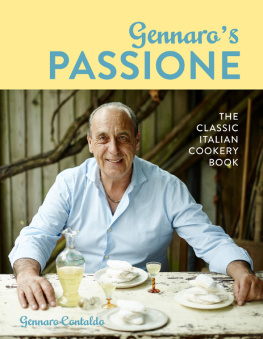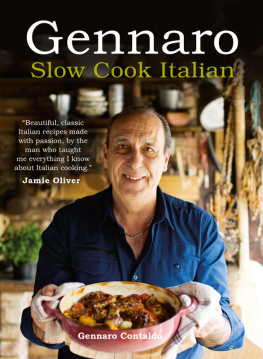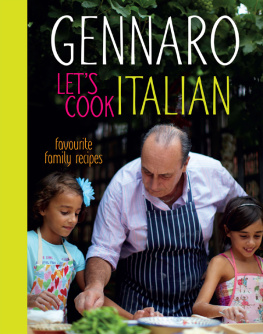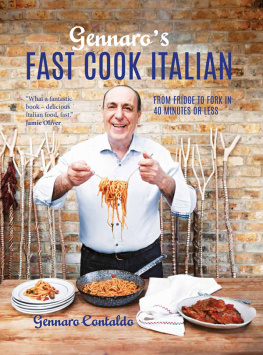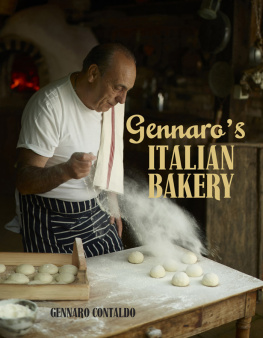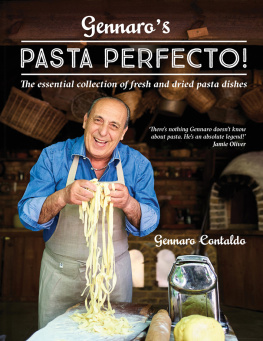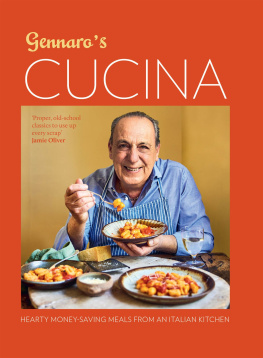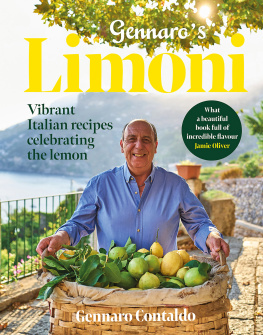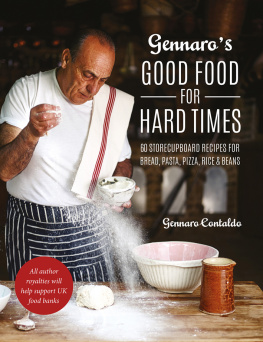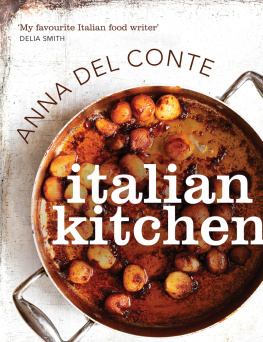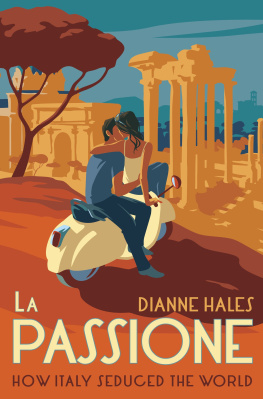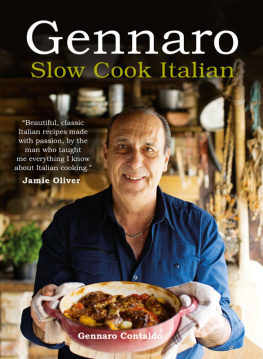Contaldo - Gennaros passione: the classic Italian cookery book
Here you can read online Contaldo - Gennaros passione: the classic Italian cookery book full text of the book (entire story) in english for free. Download pdf and epub, get meaning, cover and reviews about this ebook. City: London, year: 2017, publisher: Pavilion Books, genre: Home and family. Description of the work, (preface) as well as reviews are available. Best literature library LitArk.com created for fans of good reading and offers a wide selection of genres:
Romance novel
Science fiction
Adventure
Detective
Science
History
Home and family
Prose
Art
Politics
Computer
Non-fiction
Religion
Business
Children
Humor
Choose a favorite category and find really read worthwhile books. Enjoy immersion in the world of imagination, feel the emotions of the characters or learn something new for yourself, make an fascinating discovery.
- Book:Gennaros passione: the classic Italian cookery book
- Author:
- Publisher:Pavilion Books
- Genre:
- Year:2017
- City:London
- Rating:5 / 5
- Favourites:Add to favourites
- Your mark:
- 100
- 1
- 2
- 3
- 4
- 5
Gennaros passione: the classic Italian cookery book: summary, description and annotation
We offer to read an annotation, description, summary or preface (depends on what the author of the book "Gennaros passione: the classic Italian cookery book" wrote himself). If you haven't found the necessary information about the book — write in the comments, we will try to find it.
Contaldo: author's other books
Who wrote Gennaros passione: the classic Italian cookery book? Find out the surname, the name of the author of the book and a list of all author's works by series.
Gennaros passione: the classic Italian cookery book — read online for free the complete book (whole text) full work
Below is the text of the book, divided by pages. System saving the place of the last page read, allows you to conveniently read the book "Gennaros passione: the classic Italian cookery book" online for free, without having to search again every time where you left off. Put a bookmark, and you can go to the page where you finished reading at any time.
Font size:
Interval:
Bookmark:




I enjoyed the sort of unrestricted, free-range childhood that few children today can even dream of. The mountains were my back garden. The warm, turquoise sea was a perfect paddling pool just yards away from the house where I was born. The tiny village of Minori on the beautiful Amalfi Coast of southern Italy was my heaven.
School didnt feature much in my life. I played truant constantly, and my days were spent outdoors, fishing with the local fishermen, hunting with my father, gathering herbs from the mountains for my mother and exploring the countryside. It was the perfect apprenticeship for a chef, and I was already becoming passionate about food.
As soon as I could talk, my large family and our community of neighbours taught me to love and understand the food we ate. Cooking and eating were pleasures entwined in every thread of local life. Good food was central to every family and community occasion.
The excitement I felt as a child, discovering the possibilities of taste and texture and the sheer pleasure of mealtimes, has never faded. My father, Francesco, was the first to inspire me. He was a linen dealer by trade, but was also a great cook. Unusually for an Italian man, he took on the role of main cook in the family. He had a gift for combing flavours and could create an amazing dish from practically nothing. From my father, I learned the importance of using the best and freshest ingredients. He knew which farms had the finest produce and where to catch the best fish, and he taught me to hunt for game.
On Sundays he was in his element. It was a feast day for every family, and he made ours extra special. When the church bell struck midday, all the children knew it was time to run home. I would drop whatever I was doing and hurry through the village to my grandfathers house. What a way to work up an appetite! Glorious cooking smells wafted from every house on the way, and I could detect what each family was going to be eating that day. By the time I reached home, my mouth would be watering.
There were always at least 25 people around my grandfathers big table aunts, uncles and cousins, as well as my four sisters, our parents and me. The dogs and cats waited under the table for us to throw scraps, which flew more generously as the wine flowed freely. The huge kitchen would be filled with the wonderful aroma of smoke from the wood-burning oven. My father was always at the centre, holding court and, more often than not, arguing with my grandad about the right combination of ingredients a matter they both took very seriously.
My father was also serious about wanting me to attend school. It wasnt enough that I shared his passion for food; he wanted me to have an education, too. But I angered him by repeatedly playing truant. There seemed to be so many better things to do than go to school. I liked to go down to the sea armed with a hook and spend the day fishing and swimming. On cooler days, I would set off for the mountains to wander through the forests and talk to the farmers.
My mother, Eufemia, didnt mind my playing truant. In fact, she positively encouraged it. She knew she couldnt make me go to school, so she put my time to good use. She sent me to collect salt from the rocks by the sea, and herbs and mushrooms from the mountains. And she loved it when I went down to the sea and brought home fish. As an ex-dancer, she was a natural performer, and quite a character. Many village people believed she was a white witch. They turned to her for advice with their problems and swore by her herbal remedies. Fortune-telling was another of her talents. She was respected but people were also rather afraid of her powers.
I adored her. Vivacious and exuberant, always great fun to be with, she was a wonderful mother, and I think she understood me very well. She let me have my freedom but all the while she was teaching me about wild herbs and plants as I gathered them for her remedies. We were very close, and I feel proud that people often say I am like her.

When I was eleven, my father decided on a radical solution to my lack of interest in school. One morning, without warning, he dropped me off at his friends new restaurant to work in the kitchen. I worked from seven in the morning until eleven at night all through the summer. Looking back, it was child slavery. It might have been intended to send me scuttling back to the classroom but I loved it. Fascinated by every detail, I was prepared to do anything. Although the chef was strict, he taught me a great deal about food. Much to my familys irritation, I began to think I was an authority and started criticising the way they cooked at home.
Living in a small fishing village, you cant help but be aware of nature and the seasons changing around you. You can watch the weather transform in the distance over the sea. You can smell the changes in the earth and sea with each new season. I love the different seasons. The sense of anticipation as you wait for the cherries to ripen on the trees, for instance. You think you can remember the taste but when you actually eat them after an eight-month wait, the flavour is sensational. Today it feels as if there are no seasons. You can buy any food you want at any time of year. But it all tastes the same. I cant believe it when I go into a supermarket at Christmas and find cherries there. Real cherries are ready in April, May and June. To me, there is no such thing as a cherry at Christmas.
September has always been my favourite month. The smell of autumn is fantastic. With the first drop of rain, the scent of the dry earth, leaves and herbs come alive. The wind is fresher and the sea is rougher and colder. In Minori, all the tourists would disappear and the village became mine once again. I would watch the swallows, which had been with us all summer, forming groups high in the sky, ready to emigrate for the winter. The bats and lizards gradually disappeared and the fishermen brought home a different sort of catch.
Officially, it was time for me to go back to school. My teacher paid personal visits to encourage it, but to no avail. I stopped going down to the sea every day but I started going up to the mountains. The game season was beginning. The fruit was ripe on the trees, wild berries were appearing on the bushes and there was an abundance of mushrooms. Autumn is the time for finding and preserving food to enjoy in the cold winter months. The mountain farmers were curious to know why I was always wandering around on my own. But they were hospitable and kind. I wanted to watch how they lived, what they cooked and ate, and how they preserved food. I was learning all the time.
The village priests knew all about food, too. They used to eat with all the families in their flock but some households noticeably the ones with good wine to offer were visited more frequently than others. They would often move on to enjoy pudding with a different family, this time choosing one renowned for its baking. I was a favourite of Padre Mateo, a very tall priest who looked after the church. He loved children, and used to tell us stories and give us sweets and leftover communion bread. In return, we would do the work around the church for him. He always called on me to carry the cross at the benediction when someone in the village had died. It was a privilege, but I hated the job. I didnt like being in a room with a dead person. It was only made bearable because the grieving families tipped us generously and offered us lots of good food.
Next pageFont size:
Interval:
Bookmark:
Similar books «Gennaros passione: the classic Italian cookery book»
Look at similar books to Gennaros passione: the classic Italian cookery book. We have selected literature similar in name and meaning in the hope of providing readers with more options to find new, interesting, not yet read works.
Discussion, reviews of the book Gennaros passione: the classic Italian cookery book and just readers' own opinions. Leave your comments, write what you think about the work, its meaning or the main characters. Specify what exactly you liked and what you didn't like, and why you think so.

